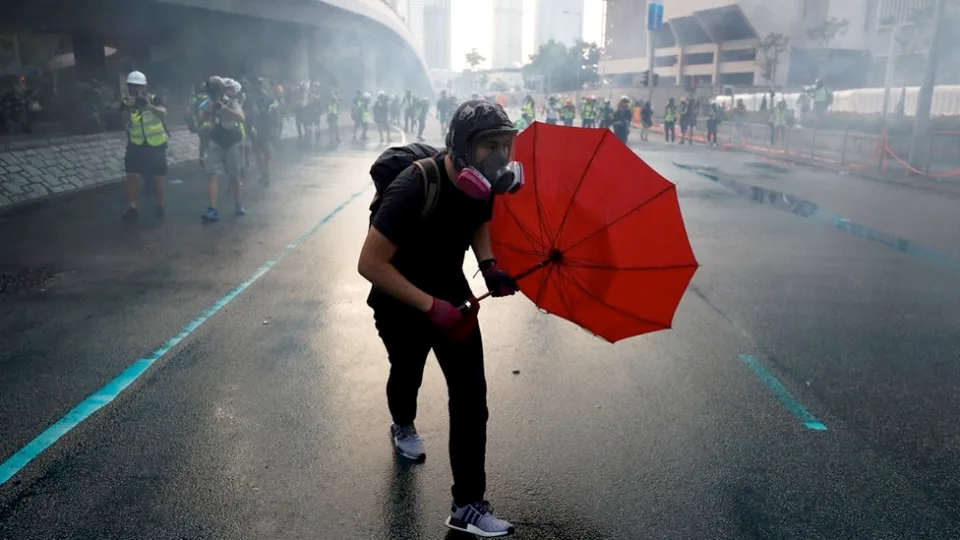Widgetized Section
Go to Admin » Appearance » Widgets » and move Gabfire Widget: Social into that MastheadOverlay zone
National security law for three years The pro-democracy movement in Hong Kong nearly disappeared
Most prominent activists are in jail or forced into exile. Many flee for fear of arrest to Taiwan, which is facing a growing threat from Beijing.
Activists who stayed in Hong Kong
Ms. Chen was sure she was being monitored. Her group of activists is the last of the long-running political groups still in Hong Kong.
“You never know when or what documents they’re going to use against you,” she said. “The red line under the law is very vague. We will just try to speak up until the day they stop us.”
Chen Baoying no longer knows where the red line is. The banners she took to the streets were blank, and the public had to read them for themselves.
Her husband, “Long Hair” Leung Kwok-hung, and 46 other democracy activists are in jail, facing charges of subversion.
“If you ask for the release of political prisoners, you risk violating the national security law,” said Zeng Kincheng, another veteran activist.
Hong Kong’s biggest national security law case began last month. If convicted of subversion, 47 of the city’s most prominent pro-democracy advocates could face life in prison.
In 2021, pro-democracy advocates, including lawmakers, academics and social workers, were arrested in an early morning raid for allegedly participating in an unofficial election. Most were barred from bail and remanded in custody for more than two years.
Critics say the judicial system is being used to suppress dissent.
In 2020, after months of anti-government protests in Hong Kong, Beijing imposed a national security law on the special administrative city.
The authorities in Beijing say the law has restored order to Hong Kong. Critics say it erodes the freedoms once promised to the former British colony.
Today, most of Hong Kong’s pro-democracy leaders are either in detention or have fled the region.
More than 1 percent of the city’s population has left since the national security law was enacted, contributing to a record population decline. More than 100,000 Hong Kong residents have moved to the UK since the government introduced an easier route to British citizenship.
More than 27,000 Hong Kongers moved to Taiwan on temporary visas between 2019 and 2021, with many hoping to resettle on the self-ruled island.
“Hong Kong as a place has fallen. Even if my friends and family are there, I won’t be able to go home and I won’t be able to see any of the things I know,” said one front-line demonstrator, who goes by the name Harry *.
“It’s our homeland, but it’s not our home anymore.”
He was involved in an assault on Hong Kong’s Legislative Council in 2019, when hundreds of demonstrators forced their way into government buildings in an attempt to block passage of a controversial overhaul of the fugitive law. He then fled Hong Kong.
But Hong Kong exiles are disappointed. Taiwan has no asylum law, and for many Hong Kong activists there, there is no clear path to status. Many fear that Taiwan’s support for Hong Kong could be seen as an unnecessary provocation as the island faces increasing threats from Beijing.
Beijing regards Taiwan as part of China and reunification with the island is inevitable, with force not ruled out.
“Taiwan is still free. We face the same enemy and are on the same side. As someone who left home to come here, if one day the Communist Party invades Taiwan, I won’t run away,” Harry said.
In a high-floor gym on a neon-lit Taipei street, a group of young Hong Kong exiles are practicing self-defense.
They wore the iconic black clothing of the 2019 protest movement, and some wore T-shirts with political slogans.
Demonstrators dressed in black and one waving a black flag during an anti-government demonstration at Hong Kong International Airport on Aug 12, 2019. [Photo/Agencies
“If I go back to Hong Kong, under the National Security Law, I will be prosecuted for my past and present condition,” said a student who went by the pseudonym Simon *. “It could be at least five years in prison.”
He lives in self-imposed exile in Taipei. He fled Hong Kong two years ago after his protester brothers were arrested. He said he would be willing to fight for Taiwan in the event of war, but worried that Taiwan’s population might not be “prepared” to deal with the threat posed by Beijing.
“If you are born in Taiwan, you are fighting the Communist Party even before you are born, so you become numb to the status quo,” said Kacey Wong, a dissident artist based in Taichung.
The protest art he created in 2019 stretches out in his warehouse as a memorial to the protest movement. His walls are covered with banners with slogans that are already illegal in Hong Kong.
He fled the former British colony in 2021 after 47 democracy activists were arrested and faced trial under national security laws.
“Our legal system has been turned into a weapon against Hong Kong people, and it’s a bit like a police government,” Mr. Wong said. Contrast that with the views of pro-Beijing lawmakers, who supported the measures taken after the tumultuous protests.
“The law is there. Everyone has to obey the law, whether you like it or not. It was passed by Hong Kong’s Legislative Council, and it’s the law we need to uphold,” Zhang Yuren, a pro-Beijing member of the legislature, said in an interview in Hong Kong.
“If you break the law, there will be consequences,” Mr. Zhang said.


